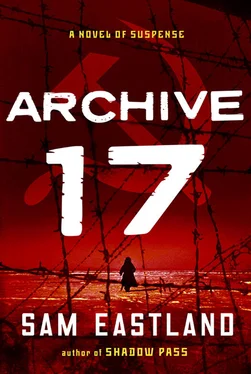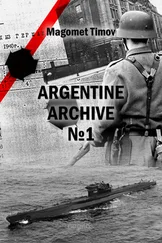Sam Eastland - Archive 17
Здесь есть возможность читать онлайн «Sam Eastland - Archive 17» весь текст электронной книги совершенно бесплатно (целиком полную версию без сокращений). В некоторых случаях можно слушать аудио, скачать через торрент в формате fb2 и присутствует краткое содержание. Жанр: Исторический детектив, на английском языке. Описание произведения, (предисловие) а так же отзывы посетителей доступны на портале библиотеки ЛибКат.
- Название:Archive 17
- Автор:
- Жанр:
- Год:неизвестен
- ISBN:нет данных
- Рейтинг книги:3 / 5. Голосов: 1
-
Избранное:Добавить в избранное
- Отзывы:
-
Ваша оценка:
- 60
- 1
- 2
- 3
- 4
- 5
Archive 17: краткое содержание, описание и аннотация
Предлагаем к чтению аннотацию, описание, краткое содержание или предисловие (зависит от того, что написал сам автор книги «Archive 17»). Если вы не нашли необходимую информацию о книге — напишите в комментариях, мы постараемся отыскать её.
Archive 17 — читать онлайн бесплатно полную книгу (весь текст) целиком
Ниже представлен текст книги, разбитый по страницам. Система сохранения места последней прочитанной страницы, позволяет с удобством читать онлайн бесплатно книгу «Archive 17», без необходимости каждый раз заново искать на чём Вы остановились. Поставьте закладку, и сможете в любой момент перейти на страницу, на которой закончили чтение.
Интервал:
Закладка:
But no one did.
Now the shooting had stopped. The camp was silent again.
Zebra stripes of sunlight gleamed through the shuttered windows.
Relieved as Klenovkin was to have been left alone by the Ostyaks, he could not help feeling a certain indignation that none of the guards had come to rescue him.
He could not fathom why the Ostyaks had mounted an assault on the camp. Nothing like this had ever happened before. He wondered what offense, conjured from their primitive and superstitious minds, had sent them on the warpath. In spite of what had happened, Klenovkin was not overly concerned. The camp guards, with their superior firepower and Sergeant Gramotin to lead them, would certainly have fought off any Ostyaks who managed to enter the camp. Nor did he worry about any prisoners attempting to escape, especially when there were Ostyaks around.
The sooner he made his way out to the compound, the fewer questions would be raised about his actions during the attack. Anxious to give the impression that he had been in the thick of the fighting, Klenovkin removed a bullet from his gun, detached the round from the brass cartridge and poured the gray sand of gunpowder into his palm. Then he spat on the powder, stirred it into a paste with his finger and daubed the mixture on his face.
Still cautious, Klenovkin climbed to his feet and peered between the shutters. The damage was worse than he’d thought.
Pale shreds of wood, all that remained of the gates, lay scattered across the compound. The two guard towers had burned and collapsed. One of the barracks was also on fire. Tar paper blazed on its roof, shingles curling like black fists in the heat. In an effort to stop the blaze from spreading, a couple of prisoners were shoveling snow up onto the roof, which seemed to have no effect at all.
Other prisoners had gathered at the cookhouse, where Melekov, refusing to alter his habits, was now handing out the breakfast rations.
In the center of the compound, a guard was kneeling on the ground, a rifle, with bayonet attached, propped against his shoulder.
Klenovkin looked closer, and recognized Platov, that idiot lapdog of Gramotin. The first thing he would do when he embarked on his inspection tour was to tell that lazy fool to get up and go back to work. But then he noticed that the rifle wasn’t resting against Platov’s shoulder as he had first imagined. In fact, Platov had been stabbed through the throat with the bayonet, which now protruded from the back of his neck. Platov was dead, propped up by the rifle, which had prevented him from falling.
No one had touched the body.
The spit dried up in Klenovkin’s mouth. Turning from the window, he picked up the phone and dialed the guardhouse. “This is Klenovkin. What is the situation?” Hearing the reply, he suddenly appeared to lose his balance and grabbed hold of the corner of his desk. “They what? All of them? With the Ostyaks? And Pekkala, too? Are you certain of this? Who has gone after them? What do you mean, nobody? You were waiting for my orders? Do you honestly think you need my permission to chase after escaped prisoners? I don’t care if the Ostyaks were with them! Get after them now! Now!” Klenovkin slammed down the receiver.
As the full measure of this disaster became clear to him, all the strength seemed to pour from his body.
He would be held responsible. His career was finished. Dalstroy would have him replaced. And that was the least of his worries. These were not just any prisoners. These were the Comitati, and for their escape he would answer directly to Moscow. His only chance was to blame Pekkala, in the hopes of deflecting Stalin’s fury.
Klenovkin slid the phone into the center of his desk. After breathing in and out several times, like a runner preparing for a race, he dialed the Kremlin.
Time slowed to a crawl as he listened to the click and crackle of the empty line. Vaguely, he recalled the night before, when his promotion through the ranks of Dalstroy had seemed a certainty. Last night felt like a dream, borrowed out of someone else’s life. Now a great spiraling darkness appeared in front of him, and Klenovkin felt himself drawn helplessly into its vortex. Finally he heard the distant purr of the telephone ringing in Moscow.
“Kremlin!” barked Poskrebyshev.
“This is Commandant Klenovkin.”
“Who?”
“Klenovkin. Commandant of the camp at Borodok. You gave me this number.”
“Ah. Borodok. Yes. You are calling to confirm that the liquidation of Pekkala has been carried out.”
“Not exactly.” Klenovkin inhaled, ready to explain, but before he had the chance a new voice broke in on the line.
“Put him through,” Stalin ordered.
Klenovkin felt as if the air had been punched out of his lungs.
Poskrebyshev pressed a button on his telephone, transferring the line to Stalin’s desk. But the secretary did not hang up as he should have done. Instead, he placed the receiver gently on his desk, then bent forward until his ear was almost pressed against it. His teeth gritted with concentration, Poskrebyshev strained to hear what was being said.
“Has Pekkala been executed,” demanded Stalin, “or hasn’t he?”
Klenovkin knew that the next words out of his mouth would change his life forever. As he tried to compose himself before delivering the answer, he stared at the white cloud of a snow squall riding in over the valley in the distance. It occurred to him that with a snowstorm coming in, all trace of the escape would be wiped clean and the prisoners would vanish forever in the taiga.
“Klenovkin? Are you there?”
“Yes, Comrade Stalin.”
“What has become of Pekkala?”
“I beg to report that the inspector escaped before I had a chance to carry out your orders.”
“Escaped? When?”
“This morning.”
“But you received my instructions last night ! He should have been shot within five minutes of your reading the message!”
“I decided to wait until morning, Comrade Stalin.”
“And what purpose could that possibly have served?” spluttered Stalin.
Ransacking his mind, Klenovkin could no longer reconstruct the train of thought in which postponing Pekkala’s execution had seemed such a good idea to him only a few hours before. “There is more, Comrade Stalin.”
“More?” he bellowed. “What else have you bungled, Klenovkin?”
“The men of the Kolchak Expedition have also managed to escape.”
For the next few seconds only a faint rustling could be heard, which neither Stalin nor Klenovkin realized was, in fact, the sound of Poskrebyshev’s breathing as he eavesdropped on the conversation.
“It is all Pekkala’s fault,” protested Klenovkin. “He made threats against you, Comrade Stalin!”
“Threats.” Stalin echoed the word. Until that moment, he’d seen no reason to doubt the camp commandant’s words, but now suspicions were gathering, like storm clouds in his mind. “What did he say exactly?”
Klenovkin was not prepared for this. He had assumed that the mere mention of a threat against the leader of the country would be enough. “What exactly?” he stammered. “Grave threats. Serious allegations, Comrade Stalin.”
There was another long pause. “Pekkala never made any threats, did he?”
“Why would you say such a thing?” pleaded Klenovkin.
“It occurs to me now, Klenovkin, that Pekkala has stood before me many times, wearing that English cannon he keeps strapped against his chest, and I have never had cause to fear him. If Pekkala wanted to kill me he would do it first and talk about it afterwards. It is not in his nature to make threats. In short, Commandant, I suspect you are lying to me.”
Klenovkin’s whole body went numb. The thought of continuing this deception seemed beyond any willpower he possessed. It was as if Stalin were staring straight into his soul. “There were no threats,” he confessed.
Читать дальшеИнтервал:
Закладка:
Похожие книги на «Archive 17»
Представляем Вашему вниманию похожие книги на «Archive 17» списком для выбора. Мы отобрали схожую по названию и смыслу литературу в надежде предоставить читателям больше вариантов отыскать новые, интересные, ещё непрочитанные произведения.
Обсуждение, отзывы о книге «Archive 17» и просто собственные мнения читателей. Оставьте ваши комментарии, напишите, что Вы думаете о произведении, его смысле или главных героях. Укажите что конкретно понравилось, а что нет, и почему Вы так считаете.











